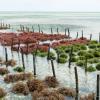
New research just published in Nature Sustainability shows that expanding global seaweed farming could go a long way to addressing the planet’s food security, biodiversity loss, and climate change challenges.
Scott Spillias from the University of Queensland’s School of Earth and Environmental Science, collaborated with researchers from the University of Queensland, IIASA, CSIRO, and the University of Tasmania to investigate whether seaweed offered a sustainable alternative to land-based agricultural expansion to meet the world’s growing need for food and materials. Spillias started this work as part of his IIASA Young Scientists Summer Program (YSSP) project when he participated in the program in the summer of 2021.
“Seaweed has great commercial and environmental potential as a nutritious food and a building block for commercial products including animal feed, plastics, fibers, diesel and ethanol,” he explains. “Our study found that expanding seaweed farming could help reduce demand for crops on land and reduce global agricultural greenhouse gas emissions (GHG) by up to 2.6 billion tonnes of CO2-equivalent per year.”
The researchers mapped the potential of farming more of the 34 commercially important seaweed species using the IIASA Global Biosphere Management Model (GLOBIOM). They estimated the environmental benefits of a range of scenarios based on land-use changes, GHG emissions, water and fertilizer use, and projected changes in species presence by 2050.
“In one scenario where we substituted 10% of human diets globally with seaweed products, the development of 110 million hectares of land for farming could be prevented,” Spillias says. “We also identified millions of available hectares of ocean within global exclusive economic zones (EEZs) – in other words, an area of the sea in which a sovereign state has special rights regarding the exploration and use of marine resources, including energy production from water and wind – where farming could be developed.”
The largest share of suitable ocean was in the Indonesian EEZ, where up to 114 million hectares is estimated to be suitable for seaweed farming. The Australian EEZ also shows great potential and species diversity, with at least 22 commercially viable species and an estimated 75 million hectares of ocean being suitable.
Spillias further said that many native species of seaweed in Australian waters had not yet been studied from a commercial production perspective.
“The way I like to look at this is to think about ancestral versions of everyday crops – like corn and wheat, which were uninspiring, weedy things,” he notes. “Through thousands of years of breeding we have developed the staple crops that underpin modern societies and seaweed could very well hold similar potential in the future.”
“This study uniquely highlights the need for integrated strategies bringing together terrestrial and marine ecosystems management to address some of the mounting problems of global sustainability facing us, as well as to avoid displacing problems from the land to the ocean, and vice versa,” concludes Petr Havlík, Interim Director of the IIASA Biodiversity and Natural Resources Program.
Adapted from a press release prepared by the University of Queensland.
Reference
Spillias, S., Valin, H., Batka, M., Sperling, F., Havlík, P., Leclère, D., Cottrell, R.S., O’Brien, K.R., McDonald-Madden, E. (2022). Reducing global land-use pressures with seaweed farming. Nature Sustainability DOI: 10.1038/s41893-022-01043-y
News

23 July 2024
Introducing the IIASA Justice Framework

16 July 2024
Mapping global rooftop growth for sustainable energy and urban planning

08 March 2024
